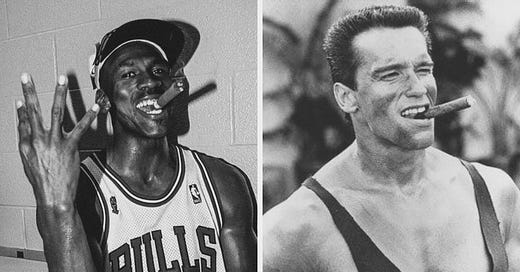As a kid in the 1980s and 90s, my childhood heroes were Michael Jordan and Arnold Schwarzenegger. They were great men admired by other men, champions amongst champions, and ambitious to be the GOAT—the greatest of all time.
Many men of my generation, especially those from my demographic, admired these kinds of men. We wanted to be the GOAT. It did not matter what; just being the GOAT was unquestionably good. The sort of self-help we grew up with—affirmations, law of attraction, neuro-linguistic programming—was littered with examples of the success of these men, making us want to be a “GOAT at life.”
The desire to be a GOAT in a single domain easily bleeds into the desire to be a GOAT in all domains, the alpha of alphas in the competition of living itself. To have a shot at being a GOAT at life, one needs to have the following trifecta:
High IQ,
Movie-star good looks,
Hyperthymic temperament—a form of sustained hypomania. Individuals with this temperament exhibit high energy and productivity, need less sleep, display extroverted behavior, possess strong self-assurance, have a determined will, and have a powerful libido.
The heroes we grew up with, action movie characters like Indiana Jones and superheroes like Batman, displayed this trifecta. Women often criticize the impossible beauty standards depicted in popular culture, but men hardly criticize impossible GOAT standards. Having impossible standards can demotivate one from doing anything.
The foundation of striving to become a GOAT at life is a mixture of “chimp politics”—the innate biological drive many men have to be a dominant alpha male—and “the spectacle”—our internet-driven culture where the scintillating image of appearance trumps the stark reality of being. While it’s impossible to truly be the GOAT at life, presenting as such and persuading others to believe it is indeed achievable.
Given this, we see internet sensations like Andrew Tate excelling in the spectacle and crafting an image of being the GOAT at life. A boring reaction is to criticize such phenomena as problematic. A more interesting response is to understand why many men find it so captivating. The reason for the captivation is that enough men want to be the alpha or live vicariously through him.
The alpha is respected.
The alpha is desired.
The alpha is in control.
The alpha is in charge.
The alpha is on top.
The alpha likes being on top, and enough others like him being on top as well. Some see such desires as a sign of “toxic masculinity” that needs to be weeded out through social reprogramming. That will never happen, and any attempt to dishonor this impulse will only create a cultural blowback that sees men like Tate rise to power.
While sports are a good way to transmute this impulse, doing so in the spectacle is not. Perhaps this transmutation strategy could occur more broadly if life is seen as a sport, with alpha-desirous men striving to become “athletes of life.” However, before adopting such a posture, one must know how to be good before becoming great.
What does being “good” even mean? It is definitely not whatever the virtue signallers pretend it is. Such goodness seems to have been forgotten. Since it cannot be readily measured, many act as if it is unreal. It is a much clearer task to appear great for instant validation rather than embarking on the project of discovering what being good actually means.
I suspect this is our mission. For our species to survive, we need to honor our primal impulses, working with them rather than waging war against them or engaging in exaggerated role-play with them in the spectacle. We must return to our deep roots, recognize our original goodness, and only then possibly become great.
Related Less Foolish entries:






